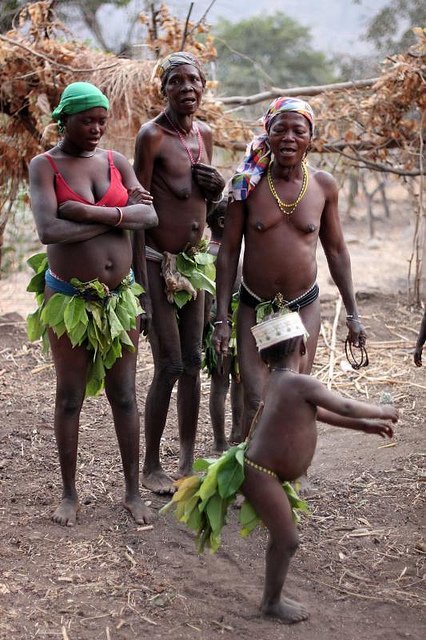The Supremacy and seniority contest between the yoruba and the edo people, have been going on for years. The two groups are always at each other's throat when it comes to history and ancestral link conversation.
For example when Oba Ereduwa Omonoba Polopolo, said that the Yoruba race originated from Benin Kingdom or when the Ooni of Ife, Adeyeye Ogunwusi, said Benin Kingdom in Edo State remained part of the expansive Yoruba race, a pronouncement that sparked strong rivalry and altercation between the two ancient kingdoms.
Let me give you a brief introduction
Some historians believe Prince Ekaladerhan of Bini was oduduwa, Oduduwa was a Yoruba divine king. and a great yoruba ancestor. According to tradition, he was the holder of the title of the Olofin of Ile-Ife, the Yoruba holy city. He ruled briefly in Ife, and also served as the progenitor of a number of independent royal dynasties in Yorubaland.
The kingship of Benin is closely related to Ife. The first king, or Oba, of Benin is traditionally supposed to be a descendant of Oduduwa, the founder of Ife.
The kingdom of Benin and Ife sprang up between the 11th and 12th centuries. The present-day Benin monarch declared his ancestry from Oranmiyan through Ekaladerhan and direct to the Ogiso dynasty.
The historical kingdom of Benin was established in the forested region of West Africa in the 1200s C.E. According to history, the Edo people of southern Nigeria founded Benin. They no longer wanted to be ruled by their kings, known as the ogisos. They asked a prince from yoruba kingdom "Ife" to take control. The first oba, or king, in Benin was Eweka. He was the son of the prince from Ife.
Another historian said "The mistake that modem historians (including Yoruba) made, as I have found from my own studies, is that they confused Oduduwa with Orunmila, the bringer of Ifa divination. It was Orunmila who, according to traditional account, had sixteen children, each of whom he sent to rule over each of sixteen communities in his own world, among which were Ife and Ado (Benin)".
The historical account of the two kingdoms are much but similar, including the tale about how the two kingdoms came from Egypt.
The Yoruba and Benin kingdom sit side by side on the map, They worship similar gods like Olokun, Ogun, Osun, Orunmila or Ifa, Esu, Sango or Esango, Aziza or Eziza, Azen or Aje Etc
The two groups also share alot of similar words and key words like Baba, Omo, Oba etc
Base on DNA analysis, some Edo groups like Esan, Akoko Ado and Owan share similar DNA with different yoruba groups infact the rare "Ghost DNA" that was discovered among the yoruba group in Nigeria, Benin republic and Mende people was also discovered in the Esan and Owan people of Edo state.
The Reality is that, Benin as mix ancestral link with different yoruba Groups like Ekiti, Ondo and Osun
Most people don't know this but the Benin kingdom attacked alot of yoruba communities and took their people as slaves. Yes! The same way the fulani's attacked Ilorin, the Benin kingdom did worse.
They imposed rulers and collected taxes from Various yoruba communities.
The only yoruba group that revolted against the Benin kingdom were the Akure people but they paid dearly for it. In 1818, Akure tried to regain it territory from Benin but they failed.
A large percentage of the Binis speak Yoruba and a good number of them bear Yoruba names because during the Benin invasions of the 15th, 16th and 19th centuries, hundreds, if not thousands, of Yoruba people in parts of present–day Ondo and Ekiti states, particularly Akure, were taken to Benin as hostages. During the three centuries as well as in the 17th, 18th and 20th centuries some traders and others left Yoruba land, especially Akure to settle in Benin while some Binis moved over to live in Akure and other towns in today’s Ondo State.
Those involved in the movements from Akure to Benin as hostages or on their own married the indigenes as wives and husbands while those from Benin in Akure did the same. The descendants of such people in Benin are known as Edo ne’kue, that is Edo – Akure people, ne’kue being the way Edo people call the Akures. In Akure such cross – breed citizens are referred to as Ado – Akure, Ado being the Akure corrupt pronunciation of Edo.
Some of the Ado – Akure families in Akure are Okoro Arowolo, Edo (pronounced as Hedo), Omoregie, Imadiyi, Alafe, Eke and the Alukos and Ojos of Itaogbolu, an Akure town on the way to Ikere – Ekiti, who include Chief Joseph Bodunde Ojo (JB Ojo) of blessed memory, the first Nigerian – born principal of Government College, Ibadan (GCI). In Akure city, the Ado – Akures are mostly found in Imosun, Eyinke and Oke Aro Streets. The Edo ne’kue or Edo – Akure clans in Benin include the Akpata, Afe, Osunde, Idehen, Lawal and Lawani who live mostly in Mission Road, Upper Mission Road, Akpakpava, Lagos and Idahosa Street
Another reason many Bini people speak Yoruba is that Benin was part of the Western Region during the colonial period through 1963 when the Midwest Region was created with Benin as the capital. During those years, the Binis worked in the civil service in many towns in Yoruba land like Ibadan, Abeokuta, Oyo, Ogbomoso, Osogbo, Ilesa, Ile – Ife, Akure, Owo and Ado – Ekiti.
In the past, television and radio stations read news in both Yoruba and Edo language in Benin.
Source:
Yorubaness
The Sun
Wikipedia








0 Comments